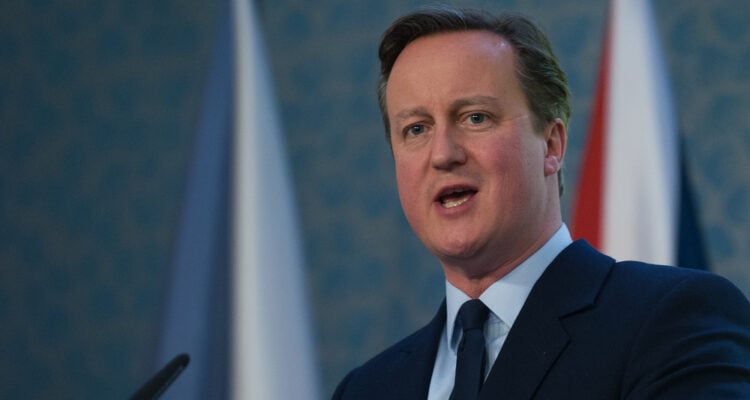To simply change our approach on arms exports would make Hamas stronger and make a hostage deal less likely, the foreign secretary told the BBC.
By JNS
British Foreign Secretary David Cameron voiced opposition to an arms embargo on Israel on Sunday, telling the BBC in an interview it would embolden the Hamas terrorist group in Gaza.
“Just to simply announce today that we will change our approach on arms exports, it would make Hamas stronger and it would make a hostage deal less likely,” Cameron told British journalist Laura Kuenssberg.
London, like Washington, is against a full-scale military invasion of the last Hamas stronghold in Rafah city, with both governments citing humanitarian concerns. However, Cameron has split with the Biden administration, which said it would stop providing offensive weapons to Israel should it conduct a wider operation in Gaza’s southernmost city.
Cameron noted that the U.K. supplies just 1% of Israel’s weapons.
He was asked whether he would follow U.S. President Joe Biden and stop weapons shipments to Israel over Rafah.
“The last time I was urged to do that, I didn’t do it. Just a few days later there was a brutal attack by Iran on Israel including 140 cruise missiles. That’s not some tiny drones, huge cruise missiles blasting into Israel. I think it [stopping arms shipments] would have sent an entirely wrong message, it would have been a very unwise move.”
Cameron continued, “Hamas must take the hostage deal [backed by Israel], you get the pause in the fighting, you build a ceasefire out of that.”
He argued that the Biden administration was in a completely different position than the U.K. “For them, it’s not a matter of principle, they are a massive state supplier of weaponry, they are involved in the IDF tactical and strategic thinking. It’s a totally different situation.”
Biden told CNN last week, “I made it clear that if they go into Rafah—they haven’t gone in Rafah yet—if they go into Rafah, I’m not supplying the weapons that have been used historically to deal with Rafah, to deal with the cities—that deal with that problem.”
Last month, Cameron said that the U.K. would continue arms exports to Israel, speaking amid calls from British politicians and public servants to suspend the sales over the war in Gaza.
Former British Prime Minister Boris Johnson spoke out against a ban on selling arms to Israel last month in a Daily Mail op-ed, writing, “The contagion has spread pretty wide, and very fast. The proposed embargo is now supported by MPs on all sides, by the former head of MI6, by some former Supreme Court Justices, and by about 600 members of the legal profession, all of them clamoring for us to turn our backs on the only democracy in the Middle East.”
Johnson wrote that should such a ban be put in place, it would likely cripple Israel and eventually lead to a Hamas victory.
“If we ban the sale of arms ourselves, it surely follows that we do not think any self-respecting country should be arming the Israelis. …We are willing the military defeat of Israel and the victory of Hamas. Remember that in order to win this conflict, Hamas only has to survive. All they need at the end is to hang on, rebuild, and go again,” said Johnson.
Cameron blasted the BBC during Sunday’s interview for failing to call Hamas terrorists.
“If you kidnap grandmothers, if you kidnap babies, if you rape people, if you shoot children in front of their parents—what more do they need to do for BBC to say, ‘Look, these are terrorists.’”





